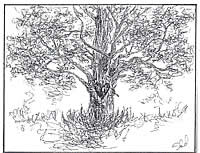The program begins with Robert Schumann’s Zigeunerleben (Gypsy Life) Opus 29, No. 8 and ends with Johannes Brahms’ Zigeunerlieder (Gypsy Songs) Opus 31.
In the Schumann, with text by Emmanuel Geibel, English text by Alicia S. Carpenter, after the opening introductory horn calls, we hear the gypsy horses riding ever closer. As the gypsies arrive at the campfire, we hear them sing in choral style, then dance widly, break camp and ride away, vanishing into the night.
My Love Dwelt in a Northern Land, the evocative poem by Scottish poet, novelist, literary critic, folk and fairy tale collector Andrew Lang, was surely chosen by Edward Elgar during one of his many dark and bitter moods. Elgar’s rich harmonies and melodies are able to evoke the character of this poetry. He stretches the form in Romantic style with variety of timbre and attacks to heighten the drama of the poetry.
Annie Laurie is so well known that it is considered a “folk song”. Its familiar Scottish “snap” (dotted rhythm which lands the accent on an unaccented beat) gives it the national character of a Scottish folk song. Its composer Alicia Scott, was a Scottish songwriter primarily known for this tune which is a setting of a poem by 17th century poet William Douglas, published in 1838.
By age 19, Arthur Sullivan was composing for the London Theater and by age 20 had published six Shakespeare songs. His setting of Echo is to a poem, Echo, written by Sir Thomas Moore.
Emily B. Tallmadge composed Song of the Beautiful to words by her husband, J.D. Tallmadge.
Ralph Vaughan Williams composed prolifically in many forms including orchestral works, songs, operas, and choral music. We sing a version of Linden Lea that has been translated into modern English from a poem My Orcha’d in Linden Lea by William Barnes. Vaughan Williams’ song for solo voice and piano has been arranged for four voice chorus by Arthur Somervell.
The familiar melody of the Polovtsian Dances, from Alexander Borodin’s opera Prince Igo, was used by Wright & Forrest as “Stranger in Paradise” in the musical Kismet. The song of the slave girls (Ul’etay na krilyah vetra (On Wings of Wind)) expresses love/longing for homeland and people.
Nuit d’etoiles, composed for solo voice and piano by Claude Debussy sets poetry by French poet and writer Théodore Faullain de Banville. We perform an arrangement for three-part women’s chorus by Alan Raines.
The poem Amor de mi Alma is Sonnet V of only 38 sonnets we have from Garcilaso de la Vega, a true Renaissance man—musician, soldier and poet who died at the age of 33 from wounds received in military combat. We present a beautiful setting for four-part men’s chorus by Z. Randall Stroope.
The Gypsy Songs (Zigeunerlieder Opus 31), by Johannes Brahms, with lyrics by Hugo Conrat, English text by Donald Neuen, exhibits the romantic ideal of the loves and lives of gypsies, encompassing the fiesta and beauty of living close to nature, living and loving freely, while experiencing if prehudice and rejection.
***




 LOVE IS ALL THERE IS: Beloved Romantic Melodies
LOVE IS ALL THERE IS: Beloved Romantic Melodies